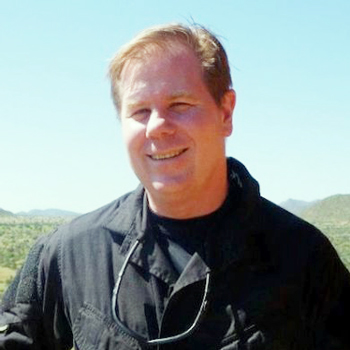After 25 years in the military, Dr. David Kilcullen needed a change. So he started Caerus Associates, which is "two-thirds tech, one-third social science, with a dash of special operations." Now he's helping solve land disputes in Monrovia, and creating crime maps in Lagos.

There's no shortage of stories about how civilians used technology to help tip the scales against Muammar Gaddafi’s army during the Libyan uprising. But few are as powerful as the one told by former U.S. military advisor Dr. David Kilcullen at last week’s Google Ideas Summit in Westlake Village, Calif. Kilcullen explained how a group of Libyan schoolgirls used Google Maps to pin the locations of snipers in their neighborhood in order to help their classmates navigate safe routes home from school. A similar story was reported to John Pollock, as told in his excellent piece on the civilian-driven information war in Libya, “People Power 2.0.” Kilcullen added that ships off the coast of Libya even used the pins as guideposts when launching strikes against Gaddafi’s soldiers.
That wisdom of the community is what drives Kilcullen’s latest venture, Caerus Associates, a consultancy firm implementing crowdsourced design solutions in war zones and post-conflict reconstruction zones around the world. Their clients include governments, NGOs, aid agencies, and the World Bank, and their projects range from solving land disputes in Monrovia, Liberia, to creating crime maps in Lagos, Nigeria, to using predictive models to map population growth in areas where urban centers don’t even exist yet.
 “We’re two-thirds tech, one-thirds social science, with a dash of special operations.” Kilcullen says. "We can go out in a community and say, 'Let’s map who owns what land,' or 'Let’s map who owes the local warlord money,' or 'Let’s map the areas in the city where you don’t feel safe.'"
“We’re two-thirds tech, one-thirds social science, with a dash of special operations.” Kilcullen says. "We can go out in a community and say, 'Let’s map who owns what land,' or 'Let’s map who owes the local warlord money,' or 'Let’s map the areas in the city where you don’t feel safe.'"
From crime to land disputes, Kilcullen and Caerus have plenty of problems to work on today. But the company is also focused on the kinds of challenges that will arise over the coming decades due to population growth (which is expected to surge past the nine million mark by 2050, according to U.N. estimates) and projected sea level rises. “We can say to open developers and to communities, in the next 20 years, with a very high degree of confidence, this is where the supermarkets need to go, this is where the population’s going to be, this is where the roads need to go. There’s actually an ability to understand what’s coming down the track.”
Beyond the commercial benefits of anticipating where to build businesses and infrastructure, handing local populations the tools to map their own lands also carries importance from a social justice perspective. Kilcullen says this empowers civilians to stand up to governments and international corporations that collude to grab land rightfully belonging to the community. "Where I think it’s most important, is in giving this community a much stronger voice in negotiating with the government and negotiating with international businesses," Kilcullen says. "International businesses come in, and they want to take land and the government’s like, 'Sure, you can have that land,' but the community doesn’t have a leg in that discussion because there’s no map of where they live. So it’s all just blank as far as anyone’s concerned. Now they can say, 'Oh no, this is the map that we built as a community and this is what we recognize as land ownership in this area.'"
Before starting Caerus, Kilcullen had spent much of his adult life working within or alongside military forces. He began his 25-year career as an infantryman in the Australian army before coming to the U.S. State Department in 2005 to work on counterinsurgency and counterterrorism measures. Two years later, he became the Senior Counterinsurgency Advisor to General David Petraeus, commander of the Coalition Forces during the Second Iraq War.
About Generation Flux Pioneers of the new (and chaotic) frontier of business Flagship Fluxers, Photo: Brooke Nipar
Flagship Fluxers, Photo: Brooke Nipar
In our February 2012 issue Fast Company Editor Robert Safian identified a diverse set of innovators who embrace instability, tolerate--and even enjoy--recalibrating careers, business models, and assumptions. People like author/Onion digital media maverick Baratunde Thurston, Greylock Data Scientist DJ Patil, Microsoft Senior Researcher danah boyd, and GE's Beth Comstock. This series continues to explore the new values of GenFlux. Find more Fluxers here. And tweet your contributions using #GenFlux.
“I came out of Iraq with a real conviction that we tend to think that a bunch of white guys turning up with a solution fixes all the problems. It doesn’t work like that. You actually have to really build a collaborative relationship with the people on the ground if you want to have any hope of understanding what’s going on.”
Because he was hired by the Bush administration, Kilcullen’s contract with the U.S. military ended on January 20, 2009 when President Obama took office. Having missed the opportunity to run an Australian ranger unit as he’d originally planned, and having developed a taste for how emergent, relatively cheap technology could be used to solve problems in war-torn areas, Kilcullen decided to take a step back from the structured, hierarchical worlds of the military and politics.
“Frankly I was having much more fun working in the tech space and in small team environments in the field,” Kilcullen says. “I realized that, yeah, you can make a lot of money as a consultant, sort of a Beltway Bandit, but it’s soul-destroying.”
The latest initiative for Caerus Associates is called the Frontier Technology Group, a hub where other companies, NGOs, and academic groups can collaboratively tackle international development challenges, then incubate and accelerate these solutions. Kilcullen says many of the products it develops will be open source, and the rest of the intellectual property will be jointly owned by members of the collective. It’s a far cry from the military culture which often values secrecy over open innovation.
“After 25 years in the army, and five years in the foreign service, it’s a breath of freedom to wake up everyday and think what does the future hold? Let’s work it.”
That said, Kilcullen's military leadership experience, and his team's willingness to venture into dangerous areas, is part of what sets Caerus apart from many other international development startups. "We don’t carry weapons, we don’t do anything military, but we have people that need to be levelheaded in those environments," Kilcullen says. "We specialize in working with communities that are under the threat of violence in frontier environments, and I think to some extent that distinguishes us a little bit from other people. Sure we can give a slick presentation in a hotel room, but what we can also do is walk the street in dangerous places, engage with communities, and figure out what needs to happen. It’s not us figuring it out, it’s them telling us, but often we find that no one’s ever been there and asked them before."
[Image: Flickr user Kader Mechrouh]